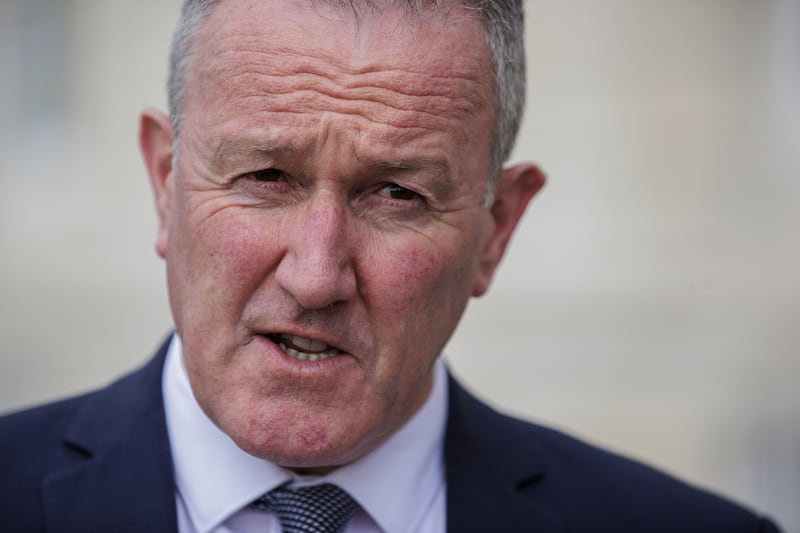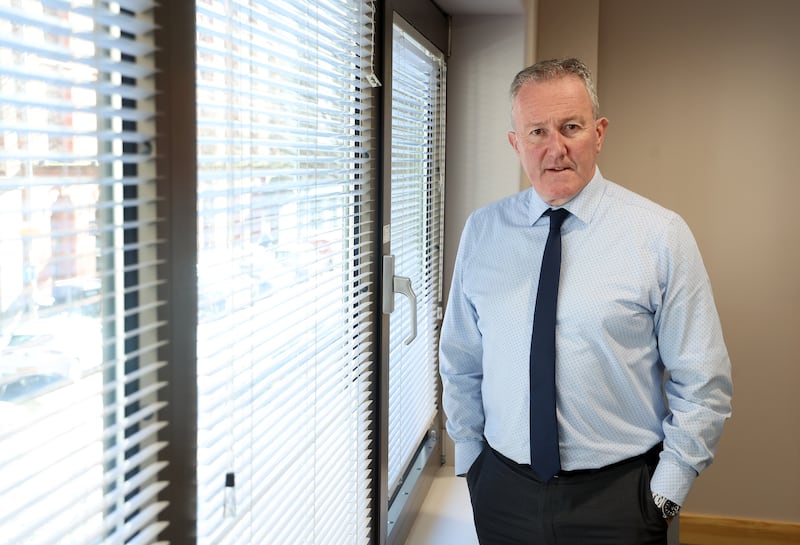The new economy minister Conor Murphy said he believes politics has got in the way of his department promoting the advantages of the north’s dual market access to the GB and EU markets.
Three weeks into his role as the first nationalist to hold the economy portfolio at Stormont, the Sinn Féin MLA said there had been a “reluctance or hesitancy” within his department and Invest NI when it came to the issue.
“Part of that was that the arrangements weren’t clear, because there was still a debate going on. But also a part of it was political, that people couldn’t go out,” he said.
“There is a benefit to be had there. It hasn’t been fully exploited.
“And we haven’t had clarity of message out of the Department for the Economy, and Invest as its primary implementation body.”
Mr Murphy said he had spoken with Invest NI’s leadership to ensure the message is clear when he leads a delegation to Washington DC for the St Patrick’s Day linked events in two weeks.
“We want to be clear in terms of the proposition for here.”
The economy minister said he also wants to make sure the message is clear to local firms.
“We want to also make sure that Invest is talking to local companies, small and medium enterprises, about their export opportunities now into the south and into Europe, and how they can access both markets.”
The new economy minister has also said he will strengthen Invest NI’s regional office infrastructure around the north “in terms of resource and personnel”.
“What we want is rather than Invest handing down its views from Belfast, is actually the regional offices are strengthened.”

There could also be more conditions attached to public money offered to foreign direct investors (FDI), which will see overseas firms encouraged to set up shop in regional areas.
“This isn’t going to be turning anybody away,” he said. “But I think our responsibility is to see how these people can facilitate our economic plans, rather than just simply come here and do what is in their own interest.”
While Mr Murphy has been critical of the economic policy developed by his DUP predecessors – known as ‘10X’ – he accepted that there won’t be time within the current mandate to restart a new consultation on a brand new strategy.
“It’s not about scrapping 10X,” he said. “But it is about recognising that there were deficiencies in 10X and that we’re trying to reshape it and redirect it in a certain fashion.
“Invest is at a place now where it is in transition. So it’s good time to kind of set new direction.”
‘I don’t personally see the solution in terms of increasing fees’
Meanwhile, the new economy minister said he is “very serious” about the executive’s commitment to expanding Ulster University’s Magee campus to 10,000 students, as laid out in the 2020 New Decade, New Approach deal.
Last year the Irish government announced £38m for a new teaching and student-services building at Magee which could see the numbers grow from 5,000 to around 6,500.
Conor Murphy said infrastructure must be built to support the expansion, including student accommodation, but he accepted funding remains the major obstacle.
Students staying in Northern Ireland to study pay around £4,700 each year in tuition fees, while those who study in Britain pay around double that.
Funding the difference means the Department for the Economy (DfE) places a cap on student places in the north.
The result is around 5,000 students leave Northern Ireland every year to study elsewhere.
Less than one-third return, and that number could rise to around 10,000 by 2030, according to the local universities.
In November 2022, a Westminster committee said the student places “a handbrake” on the Northern Ireland economy.
Former economy minister Gordon Lyons said increasing the number of places would either require higher tuition fees or taking funding from other areas.
But Conor Murphy appeared to rule out the former.
“We recognise that there’s a funding issue and the student cap is an issue for universities.
“I don’t personally see the solution in terms of increasing fees.

“I think it all at a time of cost of living crisis and family struggling… If we make access to education and skills less accessible, then I think we’re actually damaging our potential for economic growth.”
With huge pressure on Stormont’s finances, how will the expansion of Magee be funded?
“I think we have to be imaginative in the set of circumstances across nearly all areas of work that we’re doing, we are very limited,” he said.
“We obviously hope that that changes and the executive is prioritising negotiating with British government to change the fiscal framework we have.
“This was a commitment from both governments and a commitment from all the executive parties,” he added.








